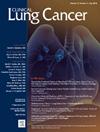Biomarker Landscape of Antibody Drug Conjugates (ADCs) and Bispecific Antibodies in Clinical Trials for Lung Cancer
IF 3.3
3区 医学
Q2 ONCOLOGY
引用次数: 0
Abstract
- •Lung cancer remains the leading cause of cancer-related mortality globally, highlighting the critical need for innovative treatment strategies. Despite advancements in therapy, the 5-year survival rate for lung cancer remains low at 26.7%. Novel therapeutic approaches such as antibody-drug conjugates (ADCs) and bispecific antibodies (bsAbs) have shown promise in improving outcomes. ADCs offer targeted cancer cell treatment with minimal cytotoxicity to normal cells, while bsAbs can recruit T cells to tumor sites, enhancing immune response without the need for T cell receptor specificity. However, current drug development often lacks a biomarker-driven approach. The study of clinical trials reveals that while 69.6% focus on bsAbs and 30.4% on ADCs, only 47.8% incorporate biomarker testing, primarily using next-generation sequencing (NGS) and immunohistochemistry (IHC). Common targets include EGFR x c-MET and PD-1 x CTLA-4 for bsAbs, and TROP2 and HER2 for ADCs, with topoisomerase inhibitors and monomethyl auristatin E as frequent payloads. Integrating prospective biomarker strategies in future trials is crucial for advancing personalized lung cancer treatments.
肺癌临床试验中抗体药物共轭物 (ADC) 和双特异性抗体的生物标记物情况。
•肺癌仍然是全球癌症相关死亡的主要原因,突出了对创新治疗策略的迫切需要。尽管治疗取得了进步,但肺癌的5年生存率仍然很低,为26.7%。新的治疗方法,如抗体-药物偶联物(adc)和双特异性抗体(bsAbs)已经显示出改善结果的希望。adc提供靶向癌细胞治疗,对正常细胞的细胞毒性最小,而bsab可以招募T细胞到肿瘤部位,增强免疫反应,而不需要T细胞受体的特异性。然而,目前的药物开发往往缺乏生物标志物驱动的方法。临床试验研究显示,69.6%的研究重点是bsab, 30.4%的研究重点是adc,只有47.8%的研究结合了生物标志物检测,主要采用下一代测序(NGS)和免疫组织化学(IHC)。常见的靶标包括针对bsab的EGFR x c-MET和PD-1 x CTLA-4,以及针对adc的TROP2和HER2,拓扑异构酶抑制剂和单甲基aurisatin E是常见的有效载荷。在未来的试验中整合前瞻性生物标志物策略对于推进个性化肺癌治疗至关重要。
本文章由计算机程序翻译,如有差异,请以英文原文为准。
求助全文
约1分钟内获得全文
求助全文
来源期刊

Clinical lung cancer
医学-肿瘤学
CiteScore
7.00
自引率
2.80%
发文量
159
审稿时长
24 days
期刊介绍:
Clinical Lung Cancer is a peer-reviewed bimonthly journal that publishes original articles describing various aspects of clinical and translational research of lung cancer. Clinical Lung Cancer is devoted to articles on detection, diagnosis, prevention, and treatment of lung cancer. The main emphasis is on recent scientific developments in all areas related to lung cancer. Specific areas of interest include clinical research and mechanistic approaches; drug sensitivity and resistance; gene and antisense therapy; pathology, markers, and prognostic indicators; chemoprevention strategies; multimodality therapy; and integration of various approaches.
 求助内容:
求助内容: 应助结果提醒方式:
应助结果提醒方式:


